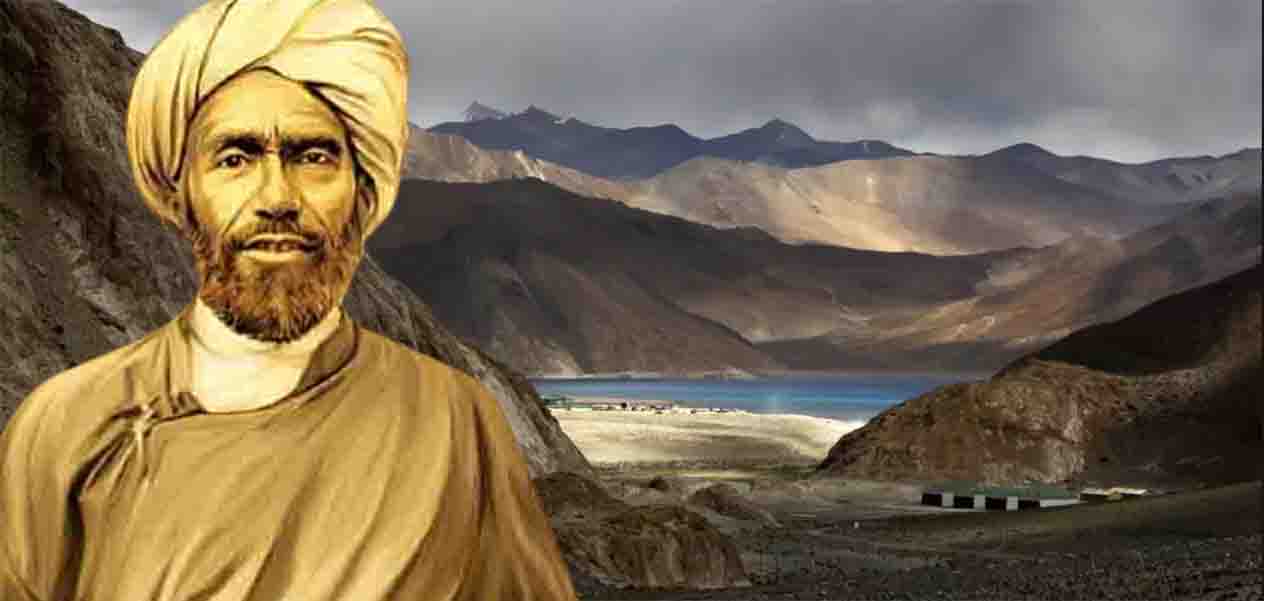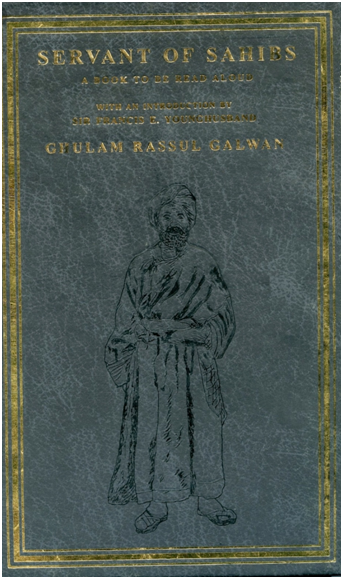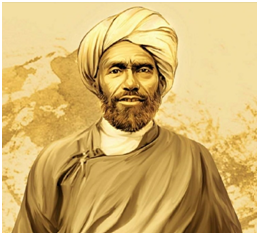
Faiyaz Ahmad Fyzie
Once an explorer had lost his way in the rugged and bland mountains of Ladakh and he could not find his way out. As luck would have it, a 14-year-old boy helped him out of the landlocked hilly region through a river. The explorer was so thankful and impressed by the boy’s bravery that he named the river after the child, Rasul Galwan. Gradually, the surrounding valley became famous as the Galwan Valley.
Rasul Galwan continued to guide famous explorers from England, Italy, Ireland, and America.
The story of the life of Rasul Galwan who hailed from the Pasmanda tribal community - from a pony-boy to the Chief Assistant to the British Joint Commissioner - is fascinating.
His name was Rasul Galwan. He added Ghulam before his name on the advice of a Sufi saint. Galwan is a name of a family, which means the horse keepers. His ancestors used to take care of horses and ponies, so his family was named Galwan. Walter Lawrence in his book The Valley of Kashmir describes Galwan as a tribe.
Warisul Anwar, a Ph.D. scholar from Aligarh Muslim University, wrote on a Kashmiri news portal that, Rasul's ancestors belonged to the famous tribe, the Galwan.
His great-grandfather Kara Galwan was a famous dacoit; he looted the rich and shared it with the poor. Poor people considered him as a guardian and the rich saw him as a constant threat. His grandfather Mahmood Galwan went to Baltistan from Kashmir and later the family settled in Leh.
Rasul was born in Leh around 1878. As a child, he painted the walls of his house with beautiful motifs. People admired his art and told his mother that one day her son would be very successful. He had a creative mindset and wanted to study. he stayed away from sports and games. There were no schools in Leh at that time and the rich people used to hire private teachers for their children. He would prod his mother to send him to a tutor. His mother told him, "We are poor people, I have no money to afford your teacher, reading and writing is the work of the rich people, not ours, our fathers were not educated, They were hard-working people, you should do the same, it will be good for you."
He replied, "Yes, our ancestors worked very hard for their livelihood, but I want to study.
"Maybe if I have good luck I will learn a few good things which will be good for the future, I want to study, if you think it is good, then let me go to the teacher. I've heard that despite being costly study is the best, and we can earn with it in the future."
His mother said, "You will work in a tailor shop, it will be better for your future and it won't be costly".
This conversation if in the book Servant of Sahibs.
His mother sent him to a tailor but he wasn't interested in it. He had been remain sad and always thought that if I was rich, I could have studied. The shopkeeper used to beat him a lot and within a month, he got fed up and fled from there.

Biography of Ghulam Rasul Galwan
At a very young age when he went on an exploration trip with Dr. Trall, his mother stitched three rupees in his kurta and asked him to use this money only when the money given by the sahibs spent out but first tell his sahib how much money you have and where is it kept. Otherwise, when the sahib is looted and he sees money with you, then he might consider you a thief.
Before leaving for the journey, his mother hugged him and both cried a lot and he cried too with her, at last, he touched his mother's feet and paid salam, and paid salam to his neighbours after that he went to his sister's home and paid salam to her too. (page 25, Servant of Sahibs)
After some time a missionary priest opened a school in Leh, and Galwan's passion for reading again started to oscillate but he knew his mother, so after getting a recommendation from his sister he enrolled in school, he quickly moved forward, leaving the other boys behind due to this the priest became very happy, He deeply praised Galwan, which further strengthened Galwan's faith in studies.
Rasul's exploration with sahibs and his studies continued. During the long journeys, Galwan kept memorizing the lessons he was taught in school. He knew languages like Ladakhi, Turkish, Urdu, Kashmiri, Tibetan, and English.
In a letter to his wife Catherine, the American traveler Robert Barrett writes, "Rasool's manners are perfect, the most policed gentleman could do not more than equal them. He is a very good person and a guardian to his men. He is a very black and very handsome man, graceful in all his movements, his smile most charming. His voice is the sweetest man's voice I ever heard. The woman lives not who would not fall in love at first sight, but his standard of morality is very high. The Women are afraid of him as a saint."
According to Lieutenant Colonel Sir Francis Younghusband, Rasul had a strong faith in God. It was his stand-by in all hardship, trials, and disappointment. And this habit of reverence was undoubtedly what made him the gentleman he was. He came from the very poorest. He started as a simple village lad. But in every situation, he behaved like a gentleman. He was a born storyteller, clearly a popular singer, and had, also, a great delight in banjo-playing.
Pasmanda has been inhabiting this land for centuries, which is why they have a natural attachment to this land and it is obvious that everyone loves his country as his mother. This has been a big reason why Pasmanda has always been on the front line in sacrificing their life for India.
Pasmanda has never been bothered as to which party or person is ruling the country; they give importance to the country and its protection. Notwithstanding the lack of resources, the Pasmandas have been making supreme sacrifices to defend their nation. This is unlike many Ashraaf, who claim their Arab origins and consider India as a conquered state.

Rasul Galwan
In Servants of Sahibs, there is another incident related to Rasul galwan's life. "Once when he returned to the camp in the evening, he found that some Chinese soldiers had assaulted Major Sahab and the Head-Man. Rasul Galwan was very angry, he beat the Chinese troops with his friends Kalam and Ramazan, later Chinese came and apologized to Major Sahab.
On the second day, Kalam suddenly came and told us that the Chinese were killing our people in the market, Rasul Galwan reached there immediately and saw that the whole market was full of Chinese soldiers and they were killing the people, he immediately jumped into the fight, Chinese soldiers broke his stick and injured him badly. He fell to the ground, yet they kept hitting him and ran away thinking that he was dead.
After some time, Major Saheb came with the headman, he told Ghulam Rasul, who was lying in a half-dead situation, "Rasul you don't have to be sad, here you have fallen alone and there are seven Chinese soldiers and one of their military officers have fallen". A triumphant smile streamed on his face. His friend Ramadan was also injured badly in this event.'
Even though the British themselves were foreigners and occupying India, Rasul thought it was more important that the morale of Chinese soldiers be broken so that they could never look at our borders. For this, he put himself and his companions's lives in danger. A year after the publication of his autobiography, in 1925, at the age of 47, he passed away.
ALSO READ: St Joseph’s Hospital witnessed Kashmir’s first Christian massacre by Pak raiders
Today, once again, Rasul Galwan is posthumously playing an important role in protecting the border of India. The discovery and naming of the valley by an Indian is further strengthening India's claim.
The author is a leading Pasmanda Rights activist
